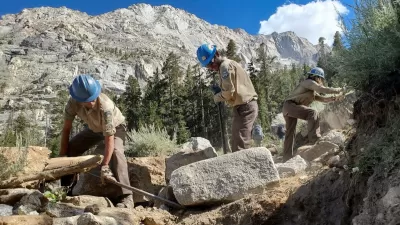Recently I’ve had a number of undergraduate students ask how to make the most of internships—over the semester and in the breaks. The following represents some advice for current students.
Recently I've had a number of undergraduate students ask how
to make the most of internships-over the semester and in the breaks. The
following represents some advice for current students.
Look early. If you start some months before you need the
internship you can use slower strategies like informational interviewing to get
a sense of opportunities in that location. People who you have interviewed may
well pass along tips later. You can also look broadly beyond typical planning
agencies to firms and nonprofits,
as well as to alumni in related fields. This will help you get a good
internship.
Focus on gaining important skills. As I noted in an earlier
blog, surveys of employers come up with a basic planning skill set involving: "communicating with others, analyzing information, working
with politics and power relations, and working responsibly and energetically in
the planning team."
That is the specific topic of your internship may be less important than these
general skills.
If you can't get a paid internship don't despair. You might
be as well off with paid work in some other field and some flexible volunteering
for a community group. As I have outlined before, paid work can demonstrate
timeliness, focus, flexibility, judgment, team work, and honesty.
Combined with your coursework this set of office skills may well be enough to
get you a job later.
If you do land an internship in planning, help your
supervisor. It is important to remember that even unpaid internships have costs
to employers as they have to put time into supervision. They may be hesitant to
have (unpaid) interns do the drudge work that needs to be done and that
everyone else in the office is doing. The intern may be left with a project
that hasn't been well thought out-which is why they are using an intern and not
paying. You need to make the work of the supervisor as easy as possible. Try to
figure out where you could help others or how to redefine the "make work"
project you have been given. If this is at all time consuming for you run it
past your supervisor to check that they see it as a wise use of your time.
If
the internship seems too boring, get advice. If you feel you are wasting your time you may be; or yiou may need to focus on what you are actually learning. Either way adivce from someone you trust can help put things in perspective--a faculty member, family friend, or even career services staff member. They can help you strategize about what to do--wrap up your work and leave, start a new project, or change your expectations.
Overall, starting early and keeping your eye on outcomes in terms of skills will help you make the most of your experience.
This is my August blog, a little late.

Alabama: Trump Terminates Settlements for Black Communities Harmed By Raw Sewage
Trump deemed the landmark civil rights agreement “illegal DEI and environmental justice policy.”

Planetizen Federal Action Tracker
A weekly monitor of how Trump’s orders and actions are impacting planners and planning in America.

The 120 Year Old Tiny Home Villages That Sheltered San Francisco’s Earthquake Refugees
More than a century ago, San Francisco mobilized to house thousands of residents displaced by the 1906 earthquake. Could their strategy offer a model for the present?

In Both Crashes and Crime, Public Transportation is Far Safer than Driving
Contrary to popular assumptions, public transportation has far lower crash and crime rates than automobile travel. For safer communities, improve and encourage transit travel.

Report: Zoning Reforms Should Complement Nashville’s Ambitious Transit Plan
Without reform, restrictive zoning codes will limit the impact of the city’s planned transit expansion and could exclude some of the residents who depend on transit the most.

Judge Orders Release of Frozen IRA, IIJA Funding
The decision is a victory for environmental groups who charged that freezing funds for critical infrastructure and disaster response programs caused “real and irreparable harm” to communities.
Urban Design for Planners 1: Software Tools
This six-course series explores essential urban design concepts using open source software and equips planners with the tools they need to participate fully in the urban design process.
Planning for Universal Design
Learn the tools for implementing Universal Design in planning regulations.
Clanton & Associates, Inc.
Jessamine County Fiscal Court
Institute for Housing and Urban Development Studies (IHS)
City of Grandview
Harvard GSD Executive Education
Toledo-Lucas County Plan Commissions
Salt Lake City
NYU Wagner Graduate School of Public Service






























